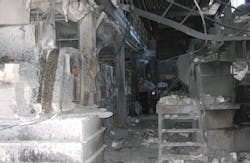New report explains likely cause of deadly explosion at Horsehead zinc refinery
The U.S. Chemical Safety Board (CSB) has released a technical analysis of the July 2010 explosion and fire at the former Horsehead zinc refinery in Monaca, Pennsylvania.
Two employees were killed in the incident and a third was seriously injured and could not return to work. The incident was investigated by several agencies, but its underlying cause remained unexplained.
A new analysis of all available evidence suggests that the explosion resulted from a build-up of superheated liquid zinc inside a ceramic zinc distillation column, which then "explosively decompressed" and ignited.
Two Horsehead operators, James Taylor and Corey Keller, were killed when the column violently ruptured inside the facility's refinery building, the CSB said. This rupture released a large amount of zinc vapor, which at high temperatures combusts spontaneously in the presence of air.
The report, prepared by William Hunter, an internationally known zinc distillation expert, concluded that Horsehead may have missed several opportunities to avoid the accident, overlooking symptoms of a blocked column sump that were evident days before the explosion.
"Missing these critical points indicates that, in large measure, hazardous conditions at Monaca had been 'normalized' and that process management had become desensitized to what was going on. This raises the question whether sufficient technical support was provided to the plant on a regular basis," Hunter said.
The Horsehead facility in Monaca is no longer operating and the "New Jersey" zinc process, a distillation-based method that was first developed in the 1920s, is no longer used anywhere in the United States. However, some overseas companies, especially in China, continue to use this process.
"Although this particular zinc technology has ceased being used in the U.S., we felt it was important to finally determine why this tragedy occurred," explained CSB Chairman Dr. Rafael Moure-Eraso. "Our hope is that this will at last provide a measure of closure to family members, as well as inform the safety efforts of overseas companies using similar production methods."
